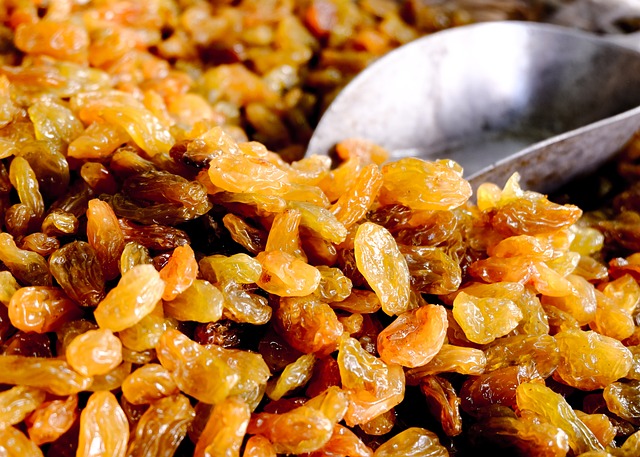Kishmish
Raisins contain antioxidants that can help neutralize free radicals in the body. The fiber in raisins can aid in digestion and help prevent constipation. They contain iron, which is important for the production of red blood cells.
Production Process:
Raisins are made by drying grapes, usually of the dark-colored varieties like Thompson Seedless, Sultana, or Black Corinth. The drying process can occur naturally from the sun or through artificial methods like dehydration.
Types of Raisins:
Thompson Seedless Raisins: These are light in color and one of the most common types.
Sultana Raisins: Golden in color, they are particularly popular in Europe and the Middle East.
Black Corinth Raisins: These are small, dark, and often used in baking and cooking.
Nutritional Content:
Raisins are a good source of energy, mainly from natural sugars like glucose and fructose.
They contain dietary fiber, promoting digestive health.
Raisins also provide small amounts of vitamins and minerals, including iron and potassium.
Health Benefits:
Antioxidants: Raisins contain antioxidants that can help neutralize free radicals in the body.
Digestive Health: The fiber in raisins can aid in digestion and help prevent constipation.
Iron: They contain iron, which is important for the production of red blood cells.
Culinary Uses:
Raisins are commonly used in baking, adding sweetness and texture to bread, cookies, and cakes.
They are popular in trail mixes, combining with nuts and other dried fruits.
Raisins can be added to salads, cereals, and oatmeal for a natural sweet flavor.
Cautions:
While raisins are generally a healthy snack, it's important to consume them in moderation due to their natural sugar content.
Some people may be allergic to sulfites, a common preservative used in dried fruits, so it's important to check labels if you have sulfite sensitivity.

Tags :